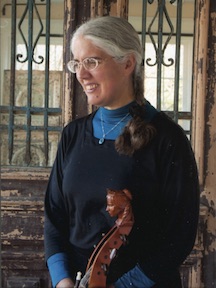By Peter Scamardo
For Laura Mazza-Dixon, the essential mission of the liberal arts is the idea that people can be educated broadly enough to participate in life beyond categories, to participate in the life of the wider community.
That presence of a community and the ability to connect with that community in both physical and emotional ways has been ever present in Mazza-Dixon’s life. It has been a major factor in her work as a music director at the Windy Hill Guitar Studio and performing at Les Amies de Theodore in Granby, Connecticut. Now she has taken the next step in further connecting with people through the publication of her book of poetry Forged by Joy (Antrim House, 2017).
“This book keeps connecting me to people in all different ways. It’s just very exciting and a wonderful adventure,” Mazza-Dixon said. “I connect to people musically too, but it’s not quite the same thing. You’re not talking about real things—you’re conveying emotional things, but you’re not actually pinpointing what it is that connects you.”
Mazza-Dixon’s path to poetry started when she was just four years old. Her maternal grandfather had just passed away, and in response, her maternal grandmother had started writing poetry in a little grey journal. Mazza-Dixon was just learning how to write at the time and was allowed to write her poems in the back of the journal while her grandmother wrote in the front.
It was her grandmother’s encouragement that kept Mazza-Dixon writing regardless of outside opinions.
For most of her life, however, what has interested Mazza-Dixon has been music, specifically classical renaissance and baroque music, something she became attached to after trips to Italy with her paternal grandparents.
Eventually, Mazza-Dixon auditioned for a degree in classical guitar at Penn State University. This came after seven years of teaching classical guitar in Long Island, something she started after a financial crisis made her decide to drop out of Oberlin College.
“I just decided it was time to get some credentials behind what I was doing,” Mazza-Dixon said. “It was a great time for me because that’s where I was introduced to Professor Harry Perison, who taught the music history courses and who encouraged me in that.”
It was Perison who recommended Mazza-Dixon for Phi Beta Kappa in 1984, though it was not the first time she had heard of the honor society. Growing up in State College, Pennsylvania, and with her maternal grandfather being a journalism professor at the university, Mazza-Dixon was well aware of the university’s chapter.
She said that it was an exciting honor but one she never expected to receive.
Mazza-Dixon was drawn back into writing poetry by a chance encounter at the Sunken Garden Poetry Festival. There she met Richard Wilbur, the two-time Pulitzer Prize winner in poetry and the U.S. Poet Laureate of 1987-88.
“I started to write again having not written much after my daughter was born,” Mazza-Dixon said. “I then went back into writing and started to correspond with him. His generous responses to me made me realize I could think of myself differently. In other words, I wasn’t just necessarily writing for myself, but maybe other people would find something in what I had written.”
That correspondence led to Mazza-Dixon seeking to complete the book of poetry that became Forged by Joy.
The book itself pulls across all the experiences of Mazza-Dixon’s life, from her childhood visits to Italy to the loss of her brother and father. She uses moments of grief to show the joy that can come from the people in someone’s life.
Mazza-Dixon said the poems in the book have experienced a great post publication life, helping her reconnect with distant relations in Italy and connect with her mother who, during the writing of Forged by Joy, suffered a stroke. Mazza-Dixon said she was thankful to have been able to share the book with her after being afraid she might not see it.
One poem, “The Brilliant Assault,” was nominated for the Pushcart Prize, a prize that recognizes the best poetry among small presses. Just like her Phi Beta Kappa nomination, she said it came as a total surprise. This nomination was extra special for Mazza-Dixon because she wrote the poem while corresponding with Richard Wilbur and she received the nomination three days before his passing at 96 years old.
Mazza-Dixon would not have been able to write Forged by Joy were it not for the unique people in her family and her community. For that reason, she tells all members of Phi Beta Kappa to not forget to reach out to people who are different from you.
Peter Scamardo is a senior at the University of Houston majoring in English with a concentration in creative writing. He is also interning at the Houston Chronicle this fall. The University of Houston is home to the Mu of Texas Chapter of Phi Beta Kappa.




